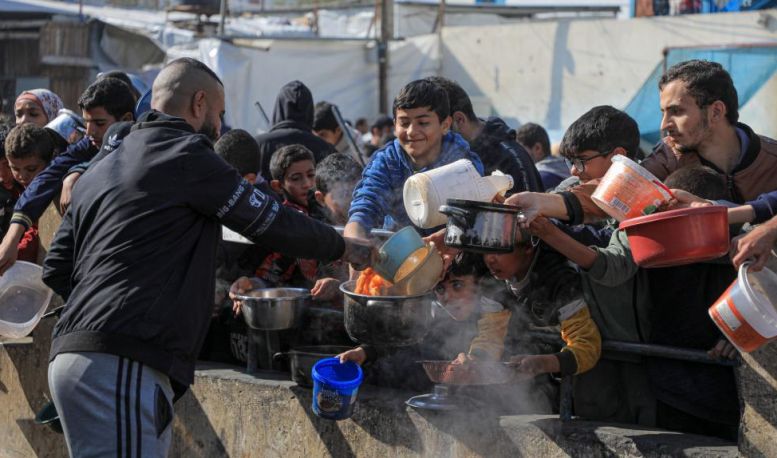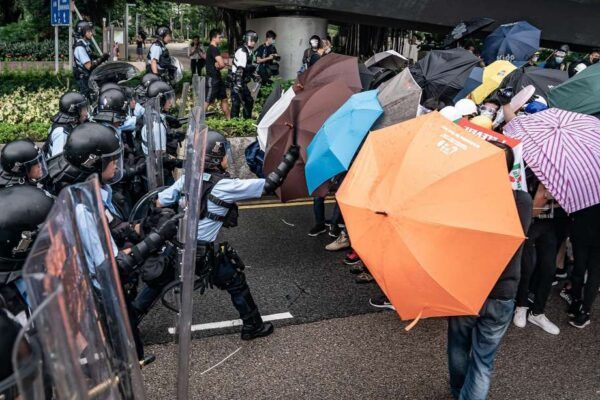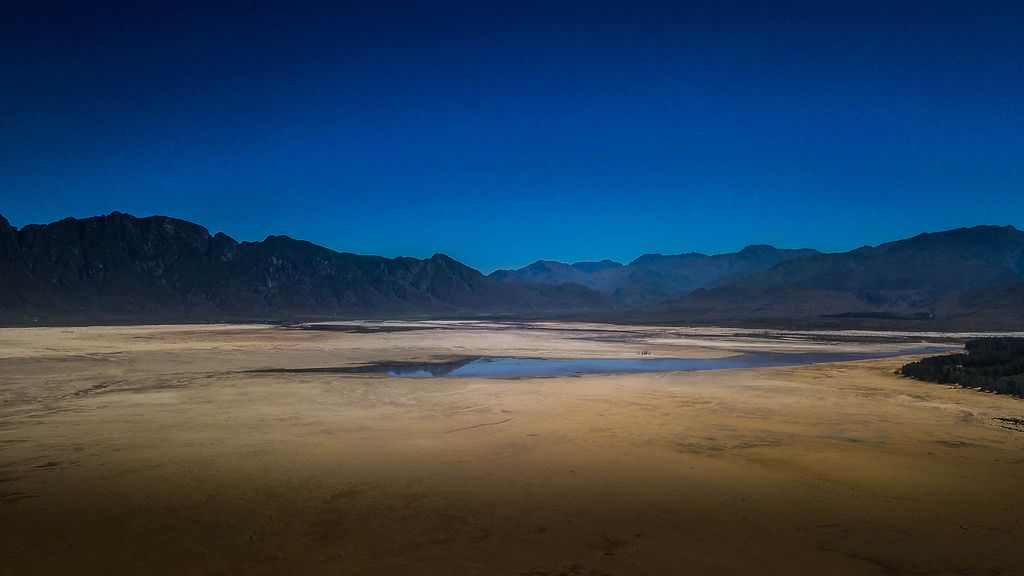Step Up the Protests!
Palestinians are trying to find shelter in Rafah, designated a safe zone by the Israeli army. Yet the deadly bombings have been stepped up and Prime Minister Netanyahu is insisting on a ground offensive which would have catastrophic consequences. It’s up to the masses of working people to build a socialist alternative to the bloodshed, in international solidarity.
With officially more than 30,000 already killed in the Israeli regime’s genocidal revenge attack on Gaza since 7 October, the Israeli army is killing on average more than 200 Palestinians a day. This far exceeds the daily death toll of all major conflicts in recent years, including those in Syria, Sudan, Iraq, Ukraine, Afghanistan and Yemen. At least 8,000 more are still missing or trapped under the rubble.
In recent weeks, the Israeli army has driven more and more Palestinians into the Rafah area in the southern Gaza Strip, on the border with Egypt. Hundreds of thousands have been crammed into temporary refugee camps there, starved in overcrowded tents without heating, without showers or toilets. Under these conditions and without functioning medical services, epidemics and infections are spreading rapidly, especially now in winter.
Some 1.4 million Palestinians are trying to find shelter in Rafah, which had been designated a safe zone by the Israeli army. Yet the deadly bombings have been stepped up and Prime Minister Netanyahu is insisting on a ground offensive which would have catastrophic consequences. The cries of mass protest against such an escalation and the (hollow) pleas from all kinds of international and government politicians are ignored.
Meanwhile, the Egyptian regime is building a walled compound south of the Gaza border to detain up to 100,000 Palestinian refugees in the Sinai desert, in case of a mass escape attempt.
Women particularly affected
About a million women and girls have been displaced, including tens of thousands of pregnant women. This is happening under unbearable conditions: lack of drinking water, forced starvation and extreme fear of the bombings. Many of them suffer malnourishment, miscarriages or premature births, and in most cases no medical help is available, while the few hospitals that still function are overrun with people with serious injuries. In the hospitals, people are treated on the floor and operations are now usually done without painkillers, “we are practising 18th-century medicine here,” described one doctor on the ground.
Even before the Israeli army’s bombing and invasion there were reports of an increase in prostitution of minors due to the extreme poverty in the strip. Now displacement and hunger are further fuelling expansion of abuse and a dramatic increase in gender-based violence.
No Trust in International Court of Justice
Ceasefire negotiations with representatives from the US, Israel, Egypt and Qatar have been unsuccessful. However, pressure is mounting on the Israeli government to reach a new ceasefire. On 26 January, the International Court of Justice (ICJ) ordered Israel to “prevent genocide”, “punish calls for genocide” and “allow humanitarian aid to get through to Gaza.” That the Court’s ruling falls short of the non-binding UN General Assembly resolution of 12 December — which called for an immediate humanitarian ceasefire and passed by 153 governments in favour and 10 against, with 23 abstentions — is sobering. Nevertheless, that Court ruling is an expression of the growing pressures from the mass solidarity movements and the threat of destabilisation of the whole region and adds further pressure.
Capitalist government leaders are concerned with ongoing Israeli aggression’s destabilising effects in the region and their plummeting public support and have begun to change their tunes. French President Macron called Netanyahu to say that Israeli operations in Gaza “must stop.” The prime ministers of Australia, Canada and New Zealand stated in a joint statement that a military operation in Rafah would be “catastrophic”. The Israeli government responded by cynically claiming “anti-semitism.”
The Israeli state is contravening over 30 UN Security Council resolutions, which are supposedly binding but not enforced. The Israeli war machine continues to kill unabated in the so-called “third phase” of the Gaza offensive, which is supposed to last six months. Already in the 14 days since the ICJ ruling, the Israeli army had killed 1,864 Palestinians including 690 children, according to Euro-Med Monitor. It continues to systematically destroy residential areas, civilian infrastructure and other facilities, making most of the Gaza Strip de facto uninhabitable. It is actively responsible for starving the Gaza population, by blocking more than 1,000 containers of UN food aid in the Israeli port city of Ashdod and by allowing far-right protesters to block aid trucks going into Gaza. Reports are starting to come in of children dying of malnutrition and dehydration. At least 104 Palestinians have been confirmed killed and 760 injured by the Israeli army’s attack on Palestinian families waiting for food aid at a roundabout south of Gaza City on 29 February, in what has been called ‘the Flour Massacre’.
Counter-attack on UNRWA
Shortly after the ICJ ruling came the news that the United Nations had dismissed 12 staff of the humanitarian aid agency UNRWA. This was based on accusations by the Israeli government that they had participated in the attack by Hamas on 7 October. The allegations alone, before evidence was produced, were enough for the US and 15 other governments (including the Canadian) to freeze more than €400 million in funding for the agency — exacerbating an already desperate humanitarian situation
While different capitalist governments have taken different stances — some choose, under pressure, to pay lip service to the indignation among “their” populations more so than others — none can be relied on as allies to the Palestinians. All will ultimately act to maintain the status quo of profit maximisation and imperialist interests. All sorts of UN resolutions and ICJ verdicts serve mainly as fig leaves behind which the political representatives of the capitalist classes hide these interests. Even the South African government’s complaint to the ICJ is no stranger to this. The ruling ANC party risks losing its absolute majority in the next elections. That would be the first time since the end of apartheid, and it is the result of decades of austerity policies that perpetuated deep inequality. Under pressure from the solidarity movement with the Palestinians, the ANC is desperately looking for ways to polish its reputation, but without damaging its close ties with Israeli big business, which has interests in the South African mining and food industries.
Imperialist interests take precedence
The role of US imperialism is even more hypocritical. While President Biden — who is widely referred to as ‘Genocide Joe’ at protests — was reportedly angry with Netanyahu over the phone, a $14 billion military aid package to Israel passed the Senate in the same week. The US has vetoed a UN Security Council ceasefire resolution for the third time (Feb 20). However, Biden is particularly angry that Netanyahu’s intransigence which is jeopardising the wider US imperialist project in the region and will cost him votes on the home front. Both further Israeli military escalations with Hezbollah across the border with Lebanon and confrontations between Iranian-backed militias and Western forces threaten to create a regional conflagration.
Netanyahu has vowed to continue the carnage until “total victory.” For him this is a matter of political survival. He is plummeting in polls, with support for his party almost halved. For the survival of his government, he relies on the far-right Kahanists, who increasingly proclaim genocidal language. For instance, following the Flour Massacre, National Security Minister Itamar Ben-Gvir said that the Israeli army “acted exceptionally” and that humanitarian aid needs to be “stopped”.
The US strategy continues to rely on Israel as a loyal ally and basis for power projection in the region. It hopes to achieve a stabilisation of the Middle East through a pacification of the Palestinian plight for national liberation, if necessary, through outsourcing the occupation to other corrupt regimes in the region. They are looking to achieve a “normalisation” of relations between Israel and Saudi Arabia as a counterweight to the Russian — and Chinese-backed regimes in Iran and Syria.
Protests show the way forward
In Morocco, large protests took place against the government’s normalising of diplomatic relations with Israel, who recognised the Moroccan occupation of Western Sahara in July this year. In Egypt, solidarity protests, which increasingly denounced (the complicity of) the el-Sisi regime, were met with harsh repression. Only following the increasing threat on Rafah has the el-Sisi regime threatened to suspend its peace treaty with Israel. The call by a diverse coalition of Palestinian organisations for a global strike, while not translating into major international action in workplaces, pressured the Lebanese government to organise a public sector strike, though that same government is now facing a two week public sector strike over wages. The call for a second global day of action on 17 February was massively followed up with marches in more than 100 cities around the world.
Against this background, actions against arms shipments to Israel are multiplying. Following important, if limited, union actions — as well as direct action by protestors — in the past months, a court case in the Netherlands in February resulted in a preliminary ban on the export of components of F-35 war planes to Israel, but the government is appealing against this verdict and the pressure needs to be stepped up. In India, The Water Transport Workers Federation, which represents 3,500 workers at 11 major Indian ports, declared on 14 February that it will refuse to load or unload arms shipments to Israel. The labour movement has a key role to play in enforcing and maintaining boycotts of arms supplies to the Israeli war machine. Unions, such as the Belgian transport unions who issued a general appeal, should promote concrete actions and support for blockades of arms shipments. Workers’ solidarity actions in any one place would generate tremendous enthusiasm and be replicated elsewhere.
The international protest movement gives essential backing to the Palestinian struggle for liberation and to those who reject Netanyahu’s state terrorism in Israel to take to the streets. As socialists fighting for Palestinian liberation with real and lasting peace in the region, International Socialist Alternative demands first of all an immediate permanent ceasefire, and that all Israeli troops be withdrawn, and the siege and occupation ended. We demand an “all for all” hostage deal, and an end to the abducting and detaining of thousands of Palestinians.
We demand full reconstruction and rehabilitation, an equal right to self-determination, security, and a dignified future for both communities, with the right of return for Palestinian refugees, including within the ‘Green Line’. We need to fight the capitalist system that perpetuates brutal national oppression, war and inequality. The region’s massive resources, which are today hoarded by a small capitalist elite, will need to be seized to this end. The ruling elites need to be overthrown and the war profiteers made to pay. It’s up to the masses of working people to build a socialist alternative to the bloodshed, in international solidarity.



